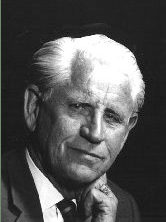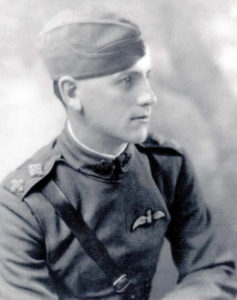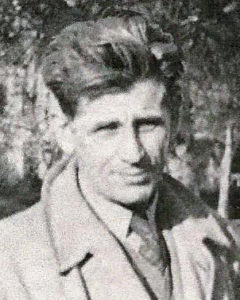[Editor’s note: We found this summary of Fred Merryfield’s life assembled by Jim Howland with help from Anne Merryfield and Burke Hayes. As Jim noted, when he and Burke remembered something different from Anne, they used her version. 3/20/01]
 Fred was born in 1900 in England and grew up there. His father was a brass foundry man who was active in early labor movements. As a result of strikes, the family experienced some hard times. Fred was an army cadet at Bury Grammar School and on graduation went into the Lancashire Regiment. There he was selected to join the Royal Flying Corps (RFC, predecessor to the RAF). He was then 17 years old. He became a fighter pilot and crashed suffering severe injuries.
Fred was born in 1900 in England and grew up there. His father was a brass foundry man who was active in early labor movements. As a result of strikes, the family experienced some hard times. Fred was an army cadet at Bury Grammar School and on graduation went into the Lancashire Regiment. There he was selected to join the Royal Flying Corps (RFC, predecessor to the RAF). He was then 17 years old. He became a fighter pilot and crashed suffering severe injuries.
 There was little opportunity for work in England at the end of World War I. Fred was offered a music scholarship at Oxford University but felt that voice was not an appropriate profession. An American friend from the RFC had a father who owned a rubber plantation in Fiji. Fred was offered a job there. As part of their demobilization, the British government gave all former military personnel free transportation to anywhere in the world. They had to travel in uniform. Fred traveled on such a ticket across Canada and to San Francisco on his way to Fiji. He had to wait for a ship; and to use his time, he went to see another friend in Medford, Oregon. He liked the countryside so well that he stayed. He once said, “It was the only time I polluted a river. I tore up my ticket and threw it in the Rogue!”
There was little opportunity for work in England at the end of World War I. Fred was offered a music scholarship at Oxford University but felt that voice was not an appropriate profession. An American friend from the RFC had a father who owned a rubber plantation in Fiji. Fred was offered a job there. As part of their demobilization, the British government gave all former military personnel free transportation to anywhere in the world. They had to travel in uniform. Fred traveled on such a ticket across Canada and to San Francisco on his way to Fiji. He had to wait for a ship; and to use his time, he went to see another friend in Medford, Oregon. He liked the countryside so well that he stayed. He once said, “It was the only time I polluted a river. I tore up my ticket and threw it in the Rogue!”
He worked on Highway 99 with the paving crew that laid the first “hot stuff” between Grants Pass and Gold Hill, and in a lumber mill in Klamath Falls. He enrolled in engineering at Oregon State Agricultural College. At one point while going to college, Fred lived in a tent near the Willamette River and worked a night shift in the nearby lumber mill.
Fred graduated in 1923, worked for the Corps of Engineers, and then for the Southern Pacific Railroad building the new railroad line up the Middle Fork of the Willamette River and over the Cascade Mountains. The chief engineer on the project had a niece, Mildred Berkeley, who lived in Pendleton, Oregon. She visited her uncle’s family in Eugene in summers, and Fred became acquainted with Mildred; they later married. Mildred died in 1964. They had no children.

Fred, circa 1948
After the railroad project, Fred returned to Oregon State to teach in the Civil Engineering Department. In 1929, Fred and Mildred moved to Chapel Hill, NC, where, in 1930, Fred received a Master’s Degree in Sanitary Engineering from the University of North Carolina. North Carolina had one of the outstanding sanitary engineering programs in the country. The Merryfields returned to Corvallis, and Fred became head of the sanitary engineering program at Oregon State Agricultural College. Fred arranged to have 9-month appointments at OAC/OSC/OSU and spend summer months working with engineering firms. He maintained he could not teach engineering adequately without practicing engineering.
Fred was a great teacher and a bit of a showman. However, he was very thorough, correcting papers for spelling and grammar as well as for the engineering involved. One time when I colored the area under a curve with purple pencil he wrote “slightly bilious, Jim.” Should you fall asleep in class, you might get hit with a piece of chalk or an eraser.
While Holly Cornell, Burke Hayes, and I were in college (we graduated in 1938), Fred had said that there was room for another engineering firm in Oregon if it were a particularly good firm. He helped us, as well as others, get scholarships for graduate studies. Holly Cornell went to Yale where the great structural innovator, Hardy Cross, headed civil engineering. Burke Hayes in electrical engineering and I in hydraulics and soil mechanics went to MIT.
When the U.S. got into WWII, Fred, then 41, sought a commission in the Corps of Engineers but had trouble passing the physical exam.
Through friends in the Army Engineers, he received a commission. The Corps originally wanted Fred to go to Europe to work on destroying German dams. They looked for him at the University of Oregon. When they finally reached him at Oregon State, it was too late; and he went to New Guinea, an extremely unhealthy place. Fred did advanced reconnaissance, mostly alone, planning air strips and identifying drinking water sources on various islands. He ate with the natives, mostly fruit and fish, lost weight, and became very ill with anemia. He was sent back to the States to an Army hospital in Utah. After recovering, Fred returned to teaching at Oregon State College.
It was Fred’s idea that resulted in the firm of Cornell, Howland, Hayes and Merryfield (CH2M) being formed in 1946. He had a rare ability to evaluate people. It was his efforts that brought many wonderful people to the firm – pleasant people of high moral standards, with strong technical skills, and the will to work hard. Fred worked part time, and during the summers virtually full time at the firm. His great contributions, in addition to his amazing ability to evaluate and recruit outstanding engineers, were his general knowledge about sanitary engineering and knowing potential clients through many contacts he had in the Northwest.
As part of his sanitary engineering leadership at the college, Fred ran short courses for water works and sewage works operators from throughout the state. Also, he was involved in the first pollution surveys on the Willamette River together with fisheries Prof. Roland Dimick. He always devoted more time and effort than was asked, both at the University and at CH2M.
In 1966, Fred retired from Oregon State University and became the full-time staff manager for CH2M, which later, through a 1971 merger, became CH2M HILL. He married Anne Herridge in 1965 who, like Fred, was born and grew up in England. She had earned a Ph.D. in biology from Oregon State.
Fred died in 1977. The following quotes are from the homily at Fred’s funeral by the Rev. Charles Neville, a longtime friend, associate, and golfing buddy: “Fred was an unusual professor. He expected everyone would be as committed as he was…He helped students in class. He involved himself personally. He expected them to give as he gave – 100%…Fred was an engineer – demanding, exacting, disciplined by facts…He was not an ivory tower introvert.”
